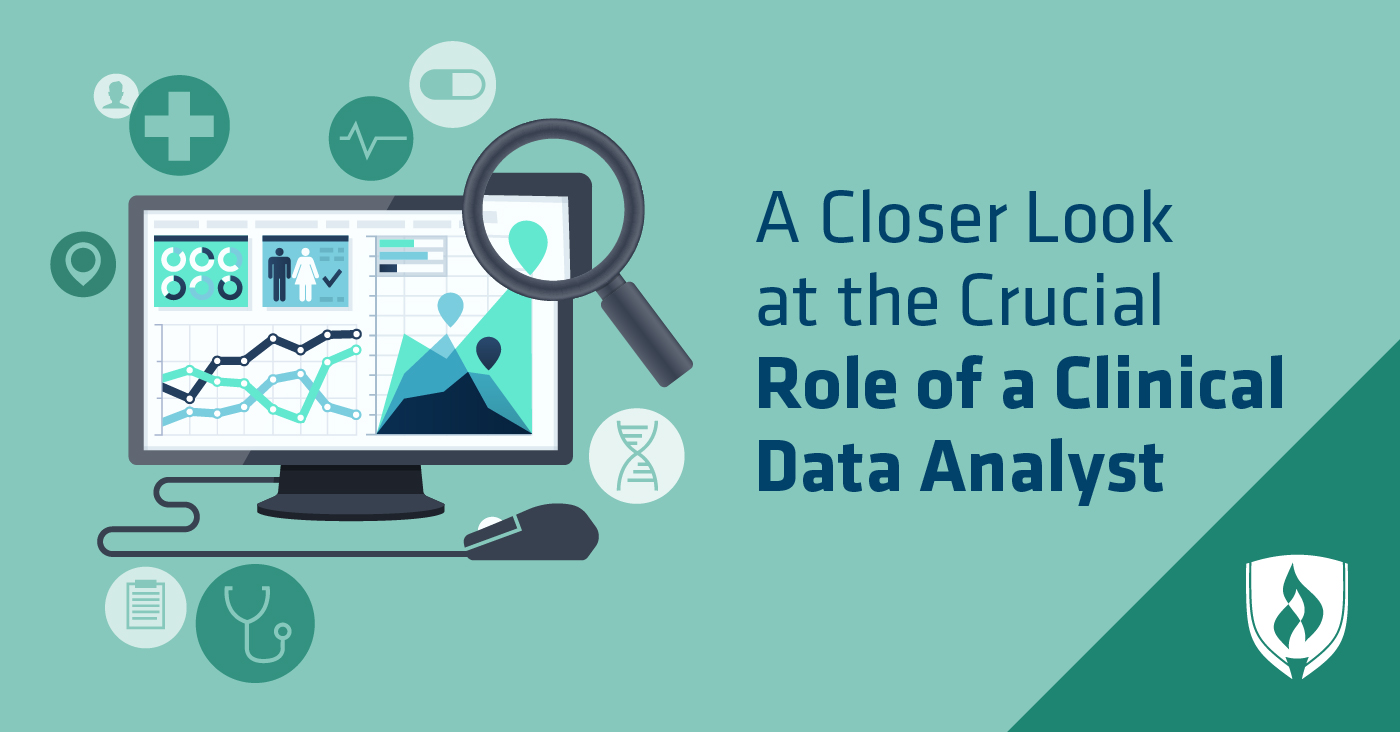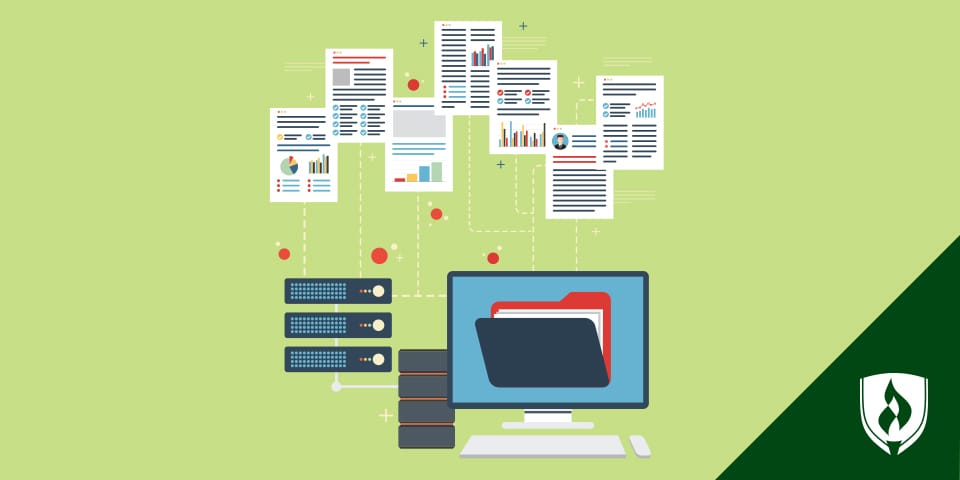
When you think about healthcare professionals, there are a few careers that probably come to mind—doctors, nurses, and maybe pharmacists. These highly profiled careers don’t include many of the critical, often invisible, professions that allow our healthcare system to function or improve.
Employment of healthcare occupations is projected to grow 14 percent from 2018 to 2028, according to the Bureau of Labor Statistics (BLS).1 Within this expansive industry is an important but easy-to-overlook role—the work of a clinical data analyst. This unique and essential role within medical care allows for safe and effective advancements in medical treatment. Though this profession may not have the glamour of the surgeons on Grey’s Anatomy, clinical data analysts have a tangible impact on how disease is understood and treated.
As you think about careers within healthcare, consider the role of a clinical data analyst. Depending on your skills, interests and educational goals, you may find this little discussed role a good fit. Let’s take a closer look at the role and day to day work of this crucial and growing profession.
What is a clinical data analyst?
Clinical data analysts are a part of clinical data management. Clinical data analysts work with the data collected over the course of a clinical trial for new medical treatments.
The experimental model used in clinical trials requires at least two groups of patients to gauge whether a new treatment is actually effective: an experimental group (receiving the new treatment) and a control group (receiving a placebo, or an imitation of the treatment). For a clinical trial to be accurate, the medical providers cannot know what patients are experimental or control, nor can the patients know whether they are receiving the treatment or a placebo—a process called a “double blind trial.”
The management of data in a clinical trial is complex, essential and highly confidential. Clinical data analysts are responsible for ensuring accurate data is collected and utilized by researchers. Because the process of clinical trials is often complex and open to the possibility of ethical violations, there are many strict rules researchers must follow when collecting, processing and storing data. Clinical research analysts are familiar with each requirement and confirm that all data is collected and stored accordingly.
Clinical data analysts are essential for making sure that medical research is conducted according to a safe, ethical and effective standard.
Where do clinical data analysts work?
Clinical data analysts are employed by organizations conducting clinical trials. This includes pharmaceutical companies, biotech companies, hospitals, clinics, colleges and universities.
What is a typical clinical data analyst job description?
Clinical data analysts work with the software programs that are used to collect and store data from the clinical trial. Sometimes clinical data analysts are responsible for creating these programs as well as teaching the programs to researchers and medical providers recording data. Clinical data analysts ensure that these programs are secure, maintain confidentiality and protect the double-blind status of the trial.
Clinical data analysts are often asked to report whether data is being collected accurately and ethically, and whether researchers are accurately portraying the data to review boards, stakeholders or other oversight groups.
Often, clinical data analysts manage data collection from multiple sources for the same clinical trial.
“Multiple sources of data continues to be a challenge,” says analytics product owner Travis Fell. “On one hand, multiple electronic health records (EHR) and lab data sources, combined with claims data from multiple payers, can help paint the picture of the entire patient journey through the continuum of care. On the other hand, integrating this data into a longitudinal patient record is a huge challenge.”
While researchers collect as much data as possible to create a complete picture of a treatment’s effect, it is up to the clinical data analyst to put the data together in a meaningful way.
What skills do clinical data analysts need?
Clinical data analysts need strengths in two primary areas: a detailed understanding of the requirements on how data is collected, processed and stored during clinical trials; and how to set up and run the necessary software.
“Data analysis is only the tip of the clinical data management iceberg,” Fell says. “In other words, clinical data analysts need to understand what’s going on in the data factory that provides data for analysis: data architecture, compliance, data quality, dimensional modeling, and extraction transformation and loading among other concepts. While clinical data analysts do not need to be experts in these areas, they do need to understand what’s going on behind the scenes to explain the data and build trust in the data with business and clinical stakeholders.”
What else are employers seeking? We analyzed over 1,200 clinical data analyst job postings to identify some of the most commonly sought-after skills employers are looking for in candidates. Here’s what we found:
Technical skills for clinical data analyst2
- Data analysis
- Clinical data review
- SQL
- Data management
- SAS
- Quality assurance and control
- Clinical research
- Tableau®
- Business intelligence
- Medical coding
- Microsoft Excel®
Transferable skills for clinical data analyst2
- Communication
- Collaboration
- Research
- Problem solving
- Organization
- Writing
- Attention to detail
- Computer literacy
- Analytical skills
How do you become a clinical data analyst?
Clinical data analysts shoulder a heavy responsibility. Their work weighs on the safety and effectiveness of medical treatment. Most clinical data analysts pursue higher education to equip them with the tools to take on clinical data analysis.
According to our review of clinical data analyst job postings, 82 percent of employers are looking for clinical data analysts with a bachelor’s degree.2 Clinical data analysts come from a variety of backgrounds. They may have a degree in a scientific field such as chemistry or biology, or they may have a background in health information management.
Interested in becoming a clinical data analyst?
Clinical data analyst is a crucial role within healthcare. With the right training, clinical data analysts can lead fulfilling, stable and financially-secure professional lives. If you think clinical data analysis might be a good fit for you, learn about the Rasmussen College Health Information Management degree program.
1Bureau of Labor Statistics, U.S. Department of Labor, Occupational Outlook Handbook, [accessed February, 2020] www.bls.gov/ooh/healthcare/home.htm . Information represents national, averaged data for the occupations listed and includes workers at all levels of education and experience. This data does not represent starting salaries. Employment conditions in your area may vary.
2Burning-Glass.com (analysis of 1,237 clinical data analyst job postings, Dec. 01, 2018 – Nov. 30, 2019).
Tableau is a registered trademark of Tableau Software.
Microsoft Excel is a registered trademark of Microsoft, Inc.




